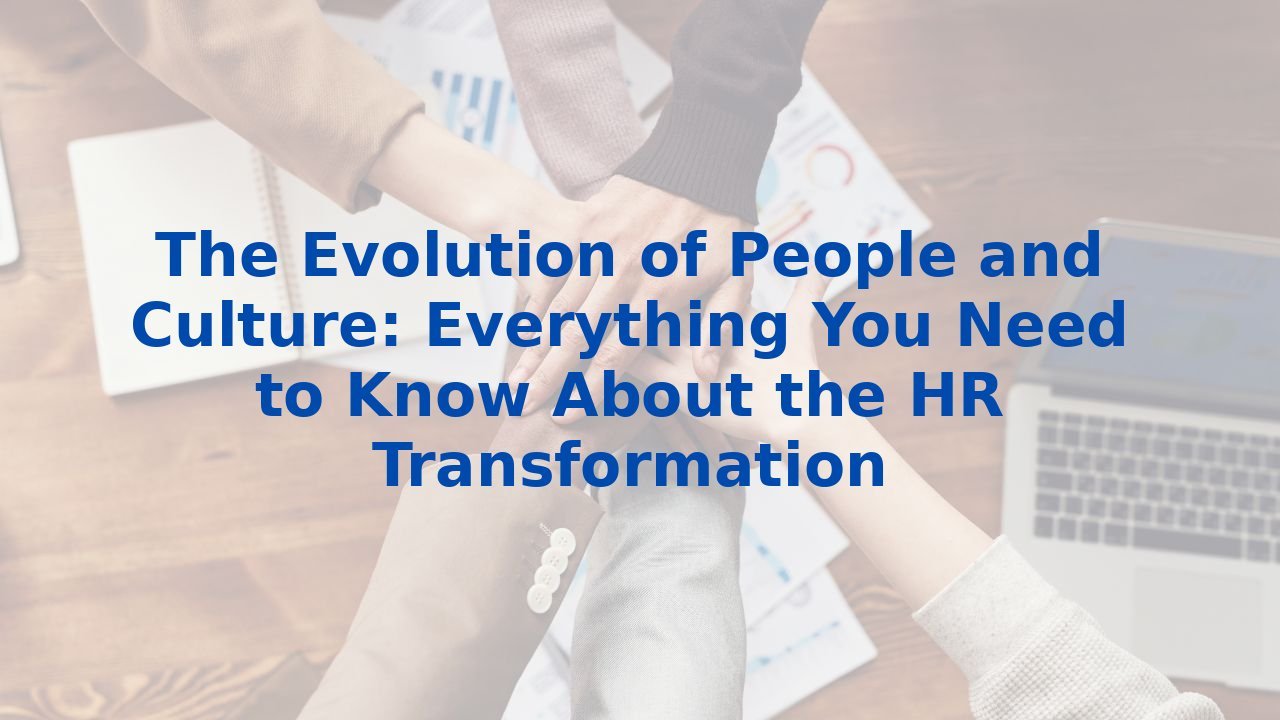The Evolution of People and Culture: Everything You Need to Know About the HR Transformation

The Evolution of People and Culture: Everything You Need to Know About the HR Transformation
In today's dynamic business landscape, the transformation of Human Resources (HR) is at the forefront of organizational evolution. As companies strive to adapt to the ever-changing demands, the need for innovative approaches to people and culture has never been more critical. At the heart of this transformation lies Artificial Intelligence (AI)—a technology promising to redefine traditional HR practices and enhance overall efficiency. In this exploration, we will delve into the general business processes within HR and illustrate how AI enhances these processes, unlocking new realms of operational efficiency.
1. The New Era of Task Automation
Task automation heralds a new era in HR. AI technologies can take on a plethora of repetitive tasks such as scheduling interviews, managing onboarding paperwork, and handling employee queries. By delegating these routine activities to AI, HR professionals can redirect their focus toward strategic functions like talent development and culture building. The result? Enhanced productivity and an invigorated workforce ready to take on complex challenges.
2. Data Analysis: A Strategic Advantage
The onboarding of AI into HR processes drastically enhances data analysis capabilities. HR departments are no strangers to data; however, extracting actionable insights traditionally required extensive manual labor. With AI, organizations can analyze employee performance, engagement levels, and retention metrics at lightning speed. This rapid analysis allows for proactive adjustments in policies and initiatives, ultimately fostering a more engaged and satisfied workforce.
3. Elevating the Employee Experience
In terms of employee experience, AI is a game changer. From personalized training programs to tailored career development paths, the technology creates an ecosystem that resonates with individual preferences and aspirations. For instance, AI-driven platforms can provide employees with the exact resources they need for skill development, all while freeing HR teams to engage more deeply with their staff. This personalized approach not only improves efficiency but also nurtures a culture of belonging and growth.
4. Process Optimization Across HR Functions
The ripple effect of AI's presence flows through every HR function, streamlining processes from recruitment to performance management. Automated systems can expedite candidate screenings, generate insightful reports for employee reviews, and even aid in conflict resolution by analyzing communication patterns within teams. By minimizing manual tasks, businesses not only save time but also mitigate human error, yielding precise outcomes that enhance decision-making.
5. Cybersecurity in HR: Protecting People and Data
In this age of digitalization, protecting sensitive employee information is paramount. AI enhances cybersecurity measures by proactively identifying potential risks and analyzing patterns that could indicate data breaches. This layer of protection ensures that employee trust remains unshaken and that the integrity of HR practices is upheld—a necessity in fostering a robust company culture.
Training Employees for AI: A Vital Investment
While harnessing AI is transformative, the human element remains indispensable. Training employees to leverage these AI systems is paramount. There are multifaceted benefits tied to equipping your workforce with AI knowledge:
- Enhanced Collaboration: Employees who understand how to work alongside AI tools can create a harmonious synergy between human intuition and machine efficiency.
- Informed Decision-Making: Trained employees are more adept at interpreting AI-generated insights, converting data into actionable strategies that propel the organization forward.
- Resilience and Adaptability: Employees skilled in AI technologies can pivot quickly, adapting to shifts in business processes and market demands with resilience.
- Cultivating Innovation: Knowledgeable employees often act as change agents, identifying innovative solutions that further harness AI capabilities, driving the organization toward uncharted territories.
Conclusion: Embrace the Transformation
The evolution of people and culture through HR transformation is not just a trend; it's a necessity. By embracing the integration of AI within HR, organizations stand to gain a competitive edge that fosters efficiency, innovation, and engagement. As we navigate this new landscape, prioritizing employee training and thoughtful implementation of AI will be paramount in unlocking the full spectrum of benefits that this technology can offer. The symbiosis of AI and human potential will undoubtedly shape the future of work, creating organizations that not only thrive but inspire.